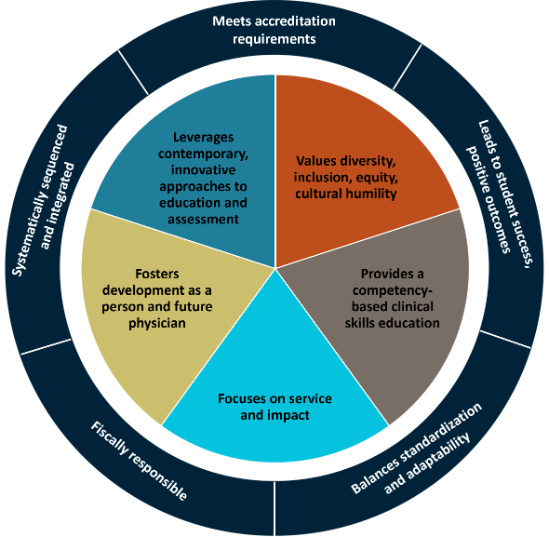
Introduction
The mission of EVMS is deeply rooted in the education and training of genuinely caring and competent physicians, equipping them with the requisite scientific, academic and humanistic skills most relevant to today’s practice of medicine. Our institution also strives to prepare students to be lifelong learners capable of adapting to changes in medical practice. Our medical school is committed to improving program performance and student learning outcomes using data-driven decision processes. As a result of our pledge to excellence, EVMS has the strategic opportunity to implement the next phase of improvement to the CareForward Curriculum (CFC).
The Faculty and Curriculum Team designed the CareFoward Curriculum to enhance learning through integration and innovation. The purpose was to develop and nurture the growth of individuals on their lifelong journey striving to be caring, compassionate, and skillful clinicians.
Rationale
In our next iteration of the CareFoward Curriculum, CFC-2.0, we seek to enhance the current medical program and build on its strong foundation. We remain unequivocally committed to developing and nurturing the growth of caring, compassionate, clinically proficient, culturally humble, community-oriented physicians!
The School of Medicine is redesigning its curriculum to support our students’ growth and continued success while simultaneously adapting to changes in the medical education landscape and future clinical practice.
- Increase time for students to practice and develop clinical skills across the entire curriculum
- Additional time for elective phase rotations
- Earlier start to clinical clerkships
- Accelerated pre-clerkship phase (achieved via refining the sequence and delivery of content)
- Refine vertical integration of curriculum and assessment
- Enhance coaching of student skillsets within and across phases of the MD program
- Preserve dedicated study time for USMLE Step 1 preparation while increasing dedicated time for Step 2 preparation
- Increase time for preparation for components of residency applications
Guiding Principles
Aligning closely with the MD program’s mission and objectives, faculty, staff, and students collaborated to develop guiding principles for planning and decision-making related to the CareForward Curriculum redesign. The principles noted in the diagram below create foundational touchpoints against which curriculum decisions are evaluated to ensure we remain consistent with the overarching goals of the new CFC-2.0. Additionally, this group identified a set of base assumptions, as seen in the dark blue circle, which indicate set criteria the new curriculum should meet overall.

Medical Education Program Objectives (Updated for CFC-2.0)
The MD program graduates are community-oriented physicians who serve their patients, colleagues, and the broader community with cultural humility and excellence. They seek to improve health outcomes through scholarship, patient education, and health prevention while supporting their personal well-being.
